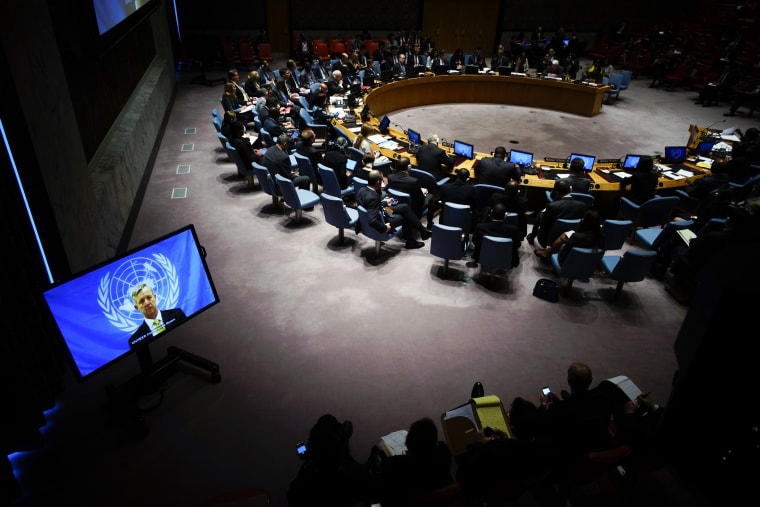The head of the United Nations Mission for Ebola Emergency Response (UNMEER) said Tuesday that he was "deeply, deeply worried" the combined international efforts of late will not be enough to stop the epidemic.
RELATED: Ebola takes toll on NYC's "Little Liberia"
"Ebola got a head start on us," Anthony Banbury, head of UNMEER, told the members of the UN Security Council Tuesday. "It is far ahead of us, it is running faster than us, and it is winning the race."
In order to turn the tide, Banbury identified four targets that must be met: identifying and tracing contacts, managing cases, ensuring safe burials, and providing people with information they can use to better protect themselves. He also set a 60-day deadline to ensure that 70% of infected people are in care facilities, and 70% of burials are done without causing further infection.
Ebola is spread through direct contact with the bodily fluids of a person who is symptomatic -- a transmission process that makes people caring for the sick or the deceased particularly vulnerable.
"If we fail at any of these, we fail entirely," said Banbury of the stated objectives. "With each passing day as more people are infected, the number of people infected grows exponentially."
Banbury's remarks echo those of President Obama and Dr. Tom Frieden, director of the Centers for Disease Control and Prevention (CDC), who have both called for a stronger response to Ebola at home and abroad. Frieden said Tuesday the CDC was setting up teams for hospitals treating Ebola patients that could be deployed "within hours" of any new cases in the U.S. So far, added Frieden, the CDC has not identified the specific breach in protocol that led to a Dallas nurse's infection -- the second diagnosed case of Ebola in the U.S., and the first person-to-person transmission.
The nurse, identified as 26-year-old Nina Pham, said Tuesday she was "doing well" in a statement released by the Texas Health Presbyterian Hospital in Dallas, where she is receiving treatment.
Photo Essay: Ebola continues its deadly march
President Obama has vowed to lead the international response to Ebola, but told defense chiefs from nearly two dozen countries on Tuesday that the "the world as a whole" was not doing enough. "Unless we contain this at the source," said Obama, "this is going to continue to pose a threat to individual countries at a time when there's no place that's more than a couple of air flights away."
Both the U.S. and U.K. have announced new screening procedures at high-traffic airports. Starting Thursday, customs and health officials will take the temperatures of passengers traveling from three West African countries hit hardest by Ebola as they arrive at Washington-Dulles, Newark, Chicago-O’Hare, and Atlanta. Such screening measures were already implemented at New York’s JFK International Airport over the weekend. Customs officials say about 150 people travel daily to the U.S. from or through Liberia, Sierra Leone, or Guinea, where the World Health Organization (WHO) estimates that the current epidemic has claimed the lives of nearly 4,500 people.
In addition to enhancing screening procedures, the U.S. is ramping up efforts to control the outbreak at its source by sending up to 4,000 military personnel to West Africa. One hundred soldiers from the 101st Airborne arrived overnight in Liberia, NBC News reported, bringing the total number of U.S. military on the ground to 565. Three of seven mobile labs are currently up and running, where U.S. technicians are processing specimen samples from suspected Ebola victims. This is as close as any U.S. service member will come to the virus, the Pentagon has stressed, as these lab technicians are only dealing with test samples, not actual patients.
But there's still a long way to go before the epidemic is truly contained. By the end of this year, there will 5,000 to 10,000 cases of Ebola per week in Guinea, Liberia, and Sierra Leone, the WHO reported Tuesday. Hours later, Liberia's Transport Minister Angeline Cassell-Bush announced that she had put herself into voluntary quarantine following the death of her driver. She is the second senior government official in the country to have possibly come into contact with Ebola.
RELATED: Ebola ravages West Africa as suspected cases pop up across U.S.
The disease is also affecting food supplies and peacekeeping missions within the afflicted region. A United Nations official reported Monday that up to 40% of farms have been abandoned in hard-hit areas in Sierra Leone, creating massive food shortages and cutting trade volume in the market to half of what it was a year ago. Elsewhere in the country, a battalion of 800 Sierra Leone soldiers awaiting deployment as peacekeepers in Somalia were placed in quarantine after one of its members tested positive for the disease, military officials said Tuesday.
